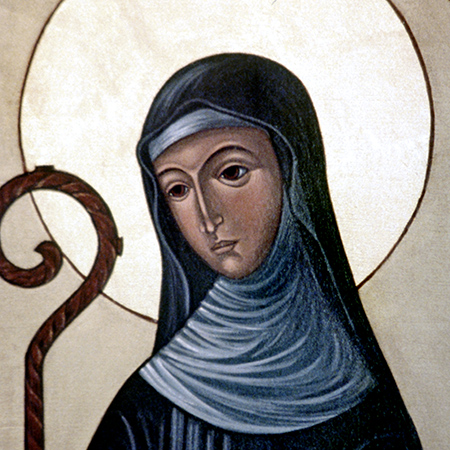There is very little known of St. Scholastica. The only story that comes down to us is the story of the rain. And in that story, the lesson that comes to us is that much is given to her because she loved much. Maybe if that is all that is remembered of us it is enough. Because all the things we acquired, we have done, we have achieved, we have accomplished would be nothing if we did not love.
In St. Scholastica there is nothing that can distract us—no proliferation of anecdotes, of accolades, of qualities, etc—just that one simple fact: SHE LOVED MUCH. Just how much did she love? If as we assume, she was a good student and disciple of her brother, Benedict, we can conclude that she showed this love by “PREFERRING NOTHING TO THE LOVE OF CHRIST!”
This gives more meaning to the word “love” which can be used to label many things that could mean, possessiveness, jealousy, wish to control, infatuation, addiction, lust, obsessiveness, etc. etc. This injunction of St. Benedict is demanding, comprehensive, absolute. And if we are honest with ourselves, even if we intellectually totally accept it as our guiding principles, we have to admit that it is more an ideal that we are always trying to reach, but which we always fall short of.

On the feastday of our patroness, who is an example of one who preferred nothing to Christ, it is good to ask ourselves, who or what can we sometimes prefer to Christ ?
1. Our family – Christ would be the last to begrudge us of our love and concern for our family. But if we are constantly worried about our family, if our worry disturbs as at prayer, in our work , and occupies most of our waking hours, could we honestly say that we are preferring Christ to our family? This should not prevent us from helping them find a solution to whatever problems they have but we have to be aware of our limitations and have to learn to rely on God to do what we are unable to do.
2. Inordinate attachments – It is not unheard of that at some time in our lives, we could develop inordinate attachments to people—friends, people we help, emotional involvements. In this, we have to guard against self deceptions because we are very good at justifying what we want to do. Here is where we have to ask ourselves whether we are preferring Christ above everyone. We have to heed the wake up calls that may come from our superiors or a good friend. A serious and honest prayer for detachment would be absolutely necessary.
3. Our work, position, turf – If we were asked if we love our work, position, turf more than Christ, we would answer with a horrified NO! But when we beg off from an assignment or transfer, what kind of preference are we showing? When after accepting an assignment, we bear resentment in our heart and remember this many years after even through our golden jubilee, how genuine was our preference of Christ?
4. Material things These may be little things like cellphones, laptops, some souvenir we have received from someone dear to us. We may not exactly prefer them to Christ but we do admit that we could be so attached to them that their loss can cause us great disturbance of spirit. We ca be glued to our computer screen or sit mesmerized viewing TV for hours and hours. But are we as focused during Lectio ?
5. OUR WILL– I think of all the things that we could prefer to Christ, the strongest is our own will. Actually in all the other addictions or attachments, our will plays a great role. But preferring our own will is shown more directly when we stick stubbornly to our opinions, our side of the story not really listening to other’s side of the story, when we refuse to forgive, when we refuse to ask forgiveness or apology.
It is really so easy to say we prefer nothing to Christ, but everyday and every decision is a struggle to do so. On this feast of St. Scholastica, let us ask her to infect us with her capacity to LOVE and to prefer nothing to the love of Christ.

